The case-law of the Constitutional Court of Georgia of 2018 have been included in the Electronic Bulletin on Constitutional Case-Law produced by the Venice Commission.
The case-law of the Constitutional Court of Georgia of 2018 have been included in the Electronic Bulletin on Constitutional Case-Law produced by the Venice Commission.
The case-law of the Constitutional Court of Georgia of 2018 have been included in the Electronic Bulletin on Constitutional Case-Law produced by the Venice Commission. The e-Bulletin’s aim is to allow judges and constitutional law specialists to be quickly informed about the most important judgments rendered in the field of constitutional justice. It regularly reports on the case-law of constitutional courts and courts with equivalent jurisdiction in Europe and beyond, including case-law of the European Court of Human Rights, the Court of Justice of the European Union and the Inter-American Court of Human Rights. The main purpose of the e-Bulletin on Constitutional Case-Law is to foster an exchange of information and ideas and to assist national judges in solving difficult questions of law, which often arise simultaneously in courts of different countries.
It shall be stressed, that those 5 judgments were published in the e-Bulletin of the Venice Commission that were also put emphasize on by the President of the Court in the Information on Constitutional Justice of 2018.
The e-Bulletin of the Venice Commission mentions judgment №1/3/1282 of July 30, 2018 of the Constitutional Court of Georgia where the Constitutional Court declared unconstitutional administrative punishment for the individual consumption of narcotic substance – Marijuana, provided that the specific fact of consumption does not poses threat to third persons and public interest.
The Constitutional Court has been actively involved in various public discussions in order to foster proper understanding of the adopted decision and the constitutional standards reflected in it. It is noteworthy, that the given judgment was widely covered by the local and international authoritative media representatives.
Moreover, in the publication a special attention is paid to the judgment N671 and N811 of July 3, 2018 where the Constitutional Court of Georgia on the one hand, deemed unconstitutional the provision of the law of Georgia “on State Property” allowing Apostolic Autocephalous Orthodox Church of Georgia free-of-charge transfer of the state-owned property and on the other hand, that provision of the Tax Code of Georgia which exempted from VAT without the right of deduction construction, restoration and painting of cathedrals and churches commissioned by the Patriarchate of Georgia.
Having regard to its findings the Court concluded that there is no logical link between the legitimate aim of protecting cultural heritage and differentiated treatment established by the disputed norm and that achieving of this legitimate aim is possible without the differentiated treatment between comparable persons in this case.
One more act that is included in the e-Bulletin is the ruling №3/10/1267,1268 of December 7 2018 of the Constitutional Court of Georgia in which the Court once again considered the right of foreign citizens to gain ownership over agricultural land in Georgia. The Constitutional Court found the disputed regulation identical to the law that prohibited foreign citizens to gain ownership over agricultural land in Georgia and was originally declared unconstitutional on 26 June 2012. The Constitutional Court also determined that the legitimate objectives of the formerly invalidated law were similar to the ones asserted by the respondent in the present case.
Moreover, the Constitutional Court pronounced that the changes to the Constitution could not be considered as being integral to the national constitutional framework until they take effect. Hence, the amendments to the Constitution of Georgia that come into force at a later date are not meant to influence the scope of the constitutional right to property as it is today. The Court held that its constitutional interpretation reiterated on two different occasions in 2012 and 2014 applied to the present case. Accordingly, the Constitutional Court declared the disputed provision unconstitutional at the preliminary stage without hearing the cases on merits.
In the publication reference was made to the judgment №2/6/1216 of July 27, 2018 of the Constitutional Court of Georgia. In the given case the Court for the first time considered the right of protection of cultural heritage and the state’s obligation in this area. The Court declared unconstitutional the provisions of the Law of Georgia on Cultural Heritage”, which excluded from the state’s monument conservation regime the objects of cultural importance that were under the ownership of religious organizations. In particular, pursuant to the disputed law, the state lacked the authority to impose responsibility upon the religious confessions in case of their failure to take care of those cultural objects that were under their ownership (enjoyment), as well as did not allow for the urgent reconstruction of cultural monuments without the consent of their owner. The Constitutional Court emphasized that the law in question served an important legitimate aim of facilitating the realization of the freedom of religion. Nevertheless, it was found by the Court that practicing religious rituals did not reasonably conflict with maintaining of culturally significant monuments and the contested law, in fact, allowed for the damage of such cultural objects without a good reason.
And finally, the publication covers the judgment N2/8/765 of December 7, 2018 of the Constitutional Court of Georgia where the Court declared unconstitutional the provision of the the Civil Procedure Code according to which a final court decision could be revised and overturned based on newly discovered facts at the court session without an oral hearing.
The Constitutional Court acknowledged that the Constitution implies the finality of a court decision as an essential guarantee of the constitutional order, yet, on the other hand, the Constitution also protects the interests of an individual to question a final court decision if necessary circumstances exist. It was observed by the Constitutional Court that the reversal of a final court decision would restrict an individual right of an applicant in a civil case if the incorrect nature of such judicial decision is not appropriately established.
The Constitutional Court further noted that newly discovered facts in a given case may, in fact, suffice to mandate the revision of only a part of the final court decision and not of every judicial finding at hand. For example, the court in a given civil case may conclude that newly discovered evidence is good enough to modify certain aspect a court consideration (scope of a claim; type of an award etc.), but does not mandate to overturn a decision as a whole. Under the disputed provision, provided newly discovered fact becomes available, which causes the court to assume that if known before, it would have adopted a more favourable to the applicant, the final court decision is negated without exceptions and proceedings restarted. The Constitutional Court declared that it would have been less restrictive if the law established the rule whereby the judges are allowed on a case-by-case basis to determine, in the fair interest of the parties, the extent to which the final court decision is overturned. The Constitutional Court found that the impugned regulation disproportionately restricted the complainant’s right to a fair trial and pronounced it unconstitutional.
It is noteworthy, that the Constitutional Court of Georgia and the Venice Commission has
It is noteworthy that the close cooperation between the Constitutional Court of Georgia and the Venice Commission has a long history. In the frame of this partnership the Constitutional Court periodically provides information on its latest judgments to the Venice Commission, as well as to other international, diplomatic and local organizations.
The e-Bulletin of the Venice Commission can be found at the following link: https://bit.ly/2QfXqWl


